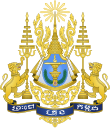
The economy of Cambodia currently follows an open market system and has seen rapid economic progress in the last decade. Cambodia had a gross domestic product (GDP) of $28.54 billion in 2022. Per capita income, although rapidly increasing, is low compared with most neighboring countries. Cambodia's two largest industries are textiles and tourism, while agricultural activities remain the main source of income for many Cambodians living in rural areas. The service sector is heavily concentrated on trading activities and catering-related services. Recently, Cambodia has reported that oil and natural gas reserves have been found off-shore.

Telecommunications in Cambodia include telephone, radio, television, and Internet services, which are regulated by the Ministry of Posts and Telecommunications. Transport and posts were restored throughout most of the country in the early 1980s during the People's Republic of Kampuchea regime after being disrupted under Democratic Kampuchea.

The system of transport in Cambodia, rudimentary at the best of times, was severely damaged in the chaos that engulfed the nation in the latter half of the 20th century. The country's weak transport infrastructure hindered emergency relief efforts, exacerbating the logistical issues of procurement of supplies in general and their distribution. Cambodia received Soviet technical assistance and equipment to support the maintenance of the transportation network.

Phnom Penh is the capital and most populous city of Cambodia. It has been the national capital since the French protectorate of Cambodia and has grown to become the nation's primate city and its economic, industrial, and cultural centre. Before Phnom Penh became capital city, Oudong was the capital of the country.
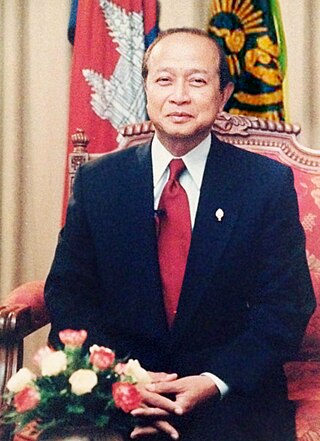
Norodom Ranariddh was a Cambodian prince, politician and law academic. He was the second son of King Norodom Sihanouk of Cambodia and a half-brother of King Norodom Sihamoni. Ranariddh was the president of FUNCINPEC, a Cambodian royalist party. He was also the first Prime Minister of Cambodia following the restoration of the monarchy, serving between 1993 and 1997, and subsequently as the President of the National Assembly between 1998 and 2006.

Poipet is a city on the Cambodian-Thai border, in Poipet Municipality, Banteay Meanchey Province. It is a key crossing point between the two countries, and also extremely popular as a gambling destination as gambling is popular, but mostly illegal in Thailand.
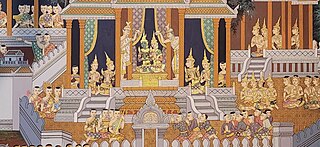
Media in Cambodia is largely unregulated and includes radio, television and print media outlets. Private sector companies have moved into the media sector, which represents a change from years of state-run broadcasting and publishing.
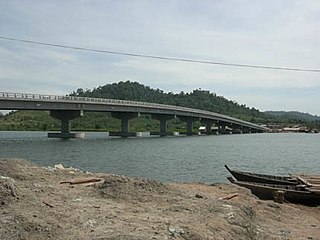
Khemarak Phoumin, also Koh Kong, is the capital and largest city of Koh Kong Province in Cambodia. It is near the mouth of the Kah Bpow river in Smach Mean Chey District on the Gulf of Thailand. The city lies only 10 kilometres (6.2 mi) from the Thai border. It is 138 kilometres (86 mi) by Highway 48 to National Highway 4 at Sre Ambel and a further 133 kilometres (83 mi) to Phnom Penh. After completion of the bridges on Highway 48 in 2010 the land link to Phnom Penh and Sihanoukville has significantly improved.

National Highway 4 or National Road No.4 (10004) is one of the national highways of Cambodia. With a length of 230 km (140 mi), it connects the capital of Phnom Penh with Sihanoukville in the south-west. Sihanoukville is the only international sea port of Cambodia, making NH4 one of the country's most important highways. The road was built in the 1950s, coinciding with the construction of the port.
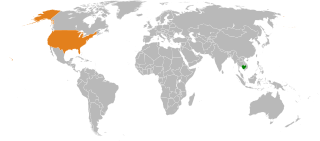
Bilateral relations between the United States and Cambodia, while strained throughout the Cold War, have strengthened considerably in modern times. The U.S. supports efforts in Cambodia to combat terrorism, build democratic institutions, promote human rights, foster economic development, eliminate corruption.

Cambodia has 612 km (380 mi) of 1,000 mm metre gauge rail network, consisting of two lines: one from the capital, Phnom Penh, to Sihanoukville, and another from Phnom Penh to Poipet, on the Thai border. The lines were originally constructed during the time when the country was part of French Indochina, but due to neglect and damage from civil war during the latter half of the 20th century, the railways were in a dilapidated state, and all services had been suspended by 2009. Through rehabilitation efforts by the government of Cambodia, with funding from the Asian Development Bank, Australian Agency for International Development (AusAID), and the Australian company Toll Holdings, freight and limited passenger service returned between Phnom Penh and Sihanoukville by 2016, and passenger service between Phnom Penh and Poipet was fully restored in 2019.

Preah Sihanouk, also Sihanoukville, is a province (khaet) in southwest Cambodia on the Gulf of Thailand. The provincial capital, also called Sihanoukville, is a deep water port city and a steadily growing and diversifying urban center on an elevated peninsula.

Gambling in China is illegal under Chinese law and has been officially outlawed since the Communist Party took power in 1949. Any form of gambling by Chinese citizens, including online-gambling, gambling overseas, opening casinos overseas to attract citizens of China as primary customers, is considered illegal. In practice however, Chinese citizens participate in state-run lotteries, regularly travel to legal gambling centers overseas or in the special administrative regions of Hong Kong and Macau and access gaming through offshore based proxy betting and online gambling companies.
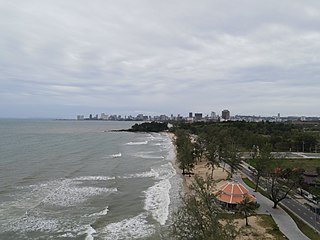
Sihanoukville, also known as Kampong Saom, is a coastal city in Cambodia and the capital of Preah Sihanouk Province, at the tip of an elevated peninsula in the country's south-west on the Gulf of Thailand. The city has a string of beaches along its entire coastline and coastal marshlands bordering Ream National Park in the east. The city has one navigable river, the mangrove-lined Ou Trojak Jet, running from Otres Pagoda to the sea at Otres. A number of thinly inhabited islands, under Sihanoukville's administration, are near the city.

Neth Savoeun is a deputy prime minister of Cambodia, serving under prime minister Hun Manet. He previously served as the National Police Chief from 2008 to 2023. Savoeun was promoted from Deputy National Police Chief to the most senior law enforcement position of the country in November 2008 after his predecessor, Hok Lundy, whose tenure was mired in controversy and accusations of corruption, died in a helicopter crash. Savoeun, who was 52 years old at the time of his appointment, is married to Prime Minister Hun Sen's niece, Hun Kimleng. Prior to the National Police force, Savoeun was the police chief of Phnom Penh during the State of Cambodia and then, after the 1993 elections, head of the justice department in the Interior Ministry’s Penal Crimes Division.
O Smach, also spelled O'Smach or Ou Smach, is a small Cambodian town on the Thai border in Samraong Municipality of Oddar Meanchey Province. Until 1999, there were intermittent battles, and the area was unsafe as the last remaining Khmer Rouge still had control of nearby Anlong Veng. In 2003, an international border crossing was opened between O Smach and the adjacent town of Chong Chom in Thailand's Surin Province. There has since opened a strip of casinos between the Cambodian and Thai passport control counters, enabling Thais to gamble in Cambodia without needing to go through Cambodian immigration. Gambling is illegal in Thailand and gambling in Cambodia is legal only for foreign passport holders. O Smach is at the northern terminus of Road 68 which turns north off National Highway 6 at Kravanh in Siem Reap Province.

Gambling, other than betting on horse races or the government-sponsored Thai lottery, is prohibited in Thailand. The prohibition dates back to the Gambling Act 1935. The Playing Cards Act prohibits private ownership of more than 120 playing cards without approval of the government. Nevertheless, illegal gambling in casinos and other forms of gambling still exist in Bangkok and some provincial towns.

NagaCorp Ltd. is a Hong Kong-listed hotel, gaming and leisure company. Its Cambodian property, NagaWorld, is the country's largest hotel and gaming resort, and is Phnom Penh's only integrated hotel-casino entertainment complex. NagaCorp holds a 70-year casino licence in Cambodia which runs until 2065, and has a monopoly within a 200-kilometre (120 mi) radius of Phnom Penh until 2045.
The Expressway network of Cambodia currently consists of one expressway in operation, one expressway under construction, and one under feasibility study. The government has noted three goals for developing an expressway network:
The COVID-19 pandemic in Cambodia was a part of the ongoing worldwide pandemic of coronavirus disease 2019 caused by severe acute respiratory syndrome coronavirus 2. The first imported case in Cambodia was detected in Sihanoukville on 27 January 2020. Although a number of imported cases and transmission to direct contacts were confirmed throughout 2020, no community transmission was detected until 29 November 2020. As of July 2021, Phnom Penh has been the most affected province with the majority of infections and deaths. Banteay Meanchey has the second-highest number of infections, whereas Kandal has second-highest number of deaths.



















